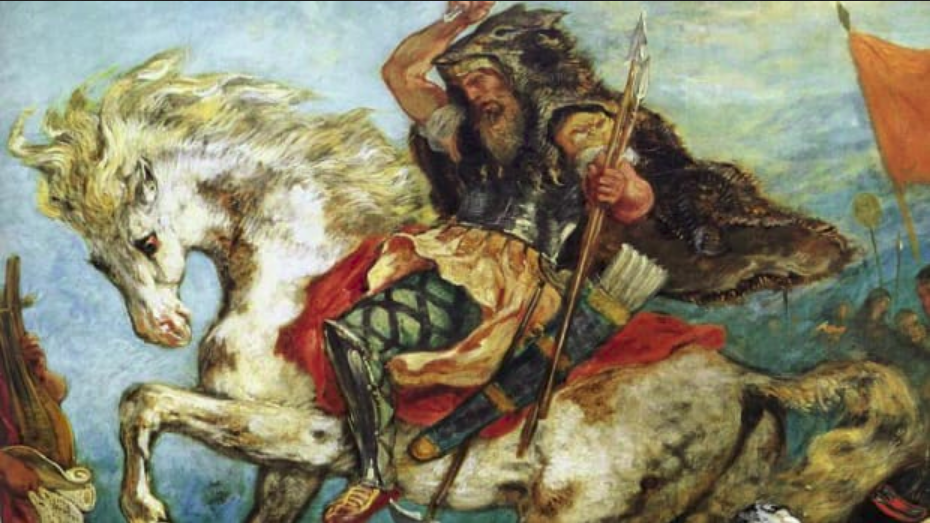
By Dr M D Magee (1998)
Christians pretended the destruction of the classical works and libraries of the ancient world was the result of the barbarian invasions, as though the barbarians were ignorant savages. Well, perhaps they were, but they were Christians. The invasions of the Western Empire were by the German nations, the Visigoths and the Vandals.
- The Visigoths, who sacked Rome in 410 AD, founded the first German kingdom in the Empire. They were Christians having been converted by Wulfila to the Arian faith half a century earlier
- The Vandals migrated through Western Europe to North Africa in 429 AD. There they founded a powerful maritime nation which harassed the shipping in the Mediterranean and in 476 AD they sacked Rome leading to the end of the Empire in the West. Like the Visigoths they were Arian Christians.
Though these tribes had put paid to the Western Empire, invasions continued for several centuries, east and west, but after Justinian the damage had been done—not by the barbarians but by the Christian bishops and their thugs. Nevertheless Christians insist that the barbarian invasions created several conditions which led to the end of culture.
- The German invasions and the declining economy destroyed the educational system largely through the decline of the cities. With the loss of the educational system, culture automatically declined too. Christians also claim that the invaders destroyed public records and urban libraries.
Naturally there is truth in this. The barbarian invasions effectively finished off the Western Empire, but the German invaders were themselves Christians, and the Roman decline had been started long before by the Christian onslaught on the culture prevailing when they took over administration of religion. The economy declined because the effectiveness of the army declined and the economy of the Empire depended in part on conquest. Christians refused to serve and urbane Romans followed suit, leaving the army to uneducated provincials and barbarian federati, who were often good soldiers but obviously lacking the commitment to Rome that had built the Empire. The economy also was damaged by maladministration by Christian administrators when Christianity dominated the Empire. The followers of the poor Galilæan were interested in riches and glorifying God—as they remain to this day.
- Papyrus used for the rolls favoured by Romans was fragile and so Latin manuscripts were easily damaged.
Of course this is true, but for hundreds of years before the Christians took power it had never been a problem—manuscripts were always being re-copied in a major industry. Under the Christians it became a problem, not because the manuscripts were fragile but because the Christian bishops would not allow them to be copied and as manuscripts cracked and flaked in use they had to be discarded without being replaced. Yet Christians claim that their monks preserved ancient culture by copying old texts. Why then was the fragile nature of papyri a problem? Surely the worthy Christian monks would have copied the papyri on to vellum or parchment. They did not, precisely because they were trying to expunge Pagan traces except the few which were acceptable.
- Literacy in Greek then Latin declined.
This has nothing to do with the barbarian invasions. The disappearance of Greek began exactly when the Christians took over and began to close the Pagan temples and Pagan schools. The link is blatant yet Christian apologists try to blame barbarian invasions. To say that some Christians themselves taught Greek is rather like saying it is fine to kill off wild animals because we have some preserved in zoos! Not surprisingly, the loss of Greek culture was followed by a decline in Latin until only the clergy used it in a bastardised form, the rest of the population being illiterate.
- Writing itself was almost lost, being preserved only by the Christian clergy and monks.
Having destroyed all means of learning it is hardly surprising that writing almost disappeared. The Christians were not interested in general learning and practical knowledge but only religious understanding. Having destroyed the Pagan schools they generally did not replace them with anything comparable. Clergymen were taught but the knowledge was sterile—it only enabled them to read the Vulgate and other devotional works. That a little learning survived in a few monasteries is true but, in fact, most scholarship was lost and had to be rediscovered at the Renaissance or relearnt afterwards.
Related posts:
Views: 0
 RSS Feed
RSS Feed

















 December 20th, 2021
December 20th, 2021  Awake Goy
Awake Goy  Posted in
Posted in  Tags:
Tags: 
















